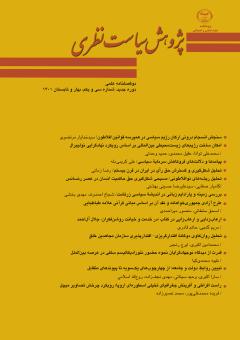ارعابزدایی و ارعابزایی در کتاب «در خدمت و خیانت روشنفکران» جلال آلاحمد
محورهای موضوعی : پژوهش سیاست نظری
1 - دانش آموخته اندیشه سیاسی دانشگاه تربیت مدرس
2 - استاد بازنشسته گروه علوم سیاسی دانشگاه تربیت مدرس
کلید واژه: بازگشت به خویشتن, جلال آلاحمد, ارعابزدایی و ارعابزایی. ,
چکیده مقاله :
نظام سیاسی حاکم در دوران پهلوی دوم با سیاستهای فرهنگی، رویکردهای اقتصادی توسعهمحور و ایجاد فضای سرکوب و خفقان، گفتمان مطلوب خود از هویت ایرانی را که از مؤلفههای غربگرایی، مدرنیسم و باستانگرایی سرچشمه میگرفت، به تنها گفتمان غالب تبدیل کرده و دیگر گفتمانها و صداهای موازی را به حاشیه برده بود. ایدۀ بازگشت به خویشتن در چنین فضایی در فضای فکری و حلقۀروشن فکران مطرح شد و مورد اقبال قرار گرفت. در قاطبۀ پژوهشها، این ایده به مثابه پاسخی به پرسش از کیستی و تمنای هویتجویی جامعه ایرانی بررسی شده است. این مقاله، پرسش محوری خود را متوجه چگونگی نسبت میان «بازگشت به خویشتن» و ارعاب نظام سیاسی حاکم کرده و بر آن است که این ایده نزد «جلال آلاحمد»، تلاشی برای بدیلسازی در مقابل گفتمان هویتی و فکری مسلط نظام سیاسی بوده است. فرضیۀ مقاله حاضر، «بازگشت به خویشتن» را تلاشی برای ارعابزدایی از گفتمان مسلط نظام سیاسی حاکم میداند؛ هرچند درون این ایده، بذر ارعابزایی و تبدیل به تکصدایی و به حاشیه بردن بدیلها و صداهای دیگر نیز پرورانده شده است.
The ruling political system duringthe Pahlavi II era, with its cultural policies, development-oriented economic views, and the creation of an atmosphere of repression and suffocation, turned its desirable discourse of Iranian identity, originated in Westernism, modernism, and archaism, into the only dominant discourse and marginalized other parallel discourses and voices. In such an atmosphere, the idea of "return to self" was raised and favored in the intellectual circle. In almost all research, this idea has been investigated as an answer to the question of identity and the desire to seek the identity of Iranian society. This article focuses its central question on the relationship between "return to self" and the Intimidation of the ruling political system and believes that according to Jalal Al-e-Ahmad, this idea has been an attempt to create an alternative to the dominant ideological and identity discourse of the political system. The hypothesis of the present article considers "return to self" as an attempt to de-Intimidationthe dominant discourse of the ruling political system; however, within this idea, the seed of Intimidationand turning into a single voice and marginalizing alternatives and other voices have also been cultivated.
